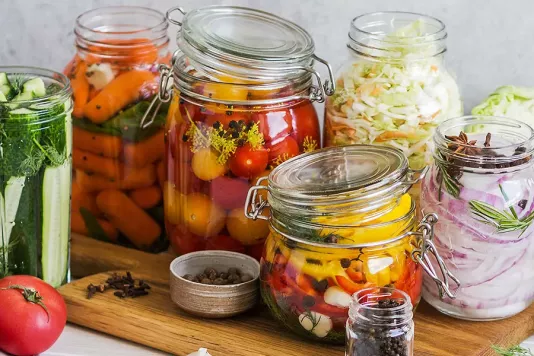
Food Preservation - History and Modernity
Food preservation for the winter is widely used in cooking and allows you to save the beneficial properties and taste of various products for the winter. Harvesting vegetables, fruits and other food products for the winter has been used for a long time, this type of culinary processing is especially popular in countries where seasonal fluctuations in the demand and supply of fresh products are pronounced. With the development of agriculture, especially the technology of growing and storing vegetables and fruits, as well as low-cost international transportation, have significantly reduced the need for canned foods. But, nevertheless, conservation and preserving of products for the winter is still popular, especially among those who grow various agricultural products themselves. In order to prepare vegetables, fruits and other products for the winter, https://kashevar.com/en/recipes/preparations they need to be subjected to a certain culinary treatment so that they are better stored and do not lose their beneficial properties. For this, several different technologies are used, which differ in the complexity of their implementation and the features of storing products.
Ways to Save Food for the Winter
Drying
Drying has long been used to prepare fruits and vegetables for long-term storage. Removing moisture from vegetables and fruits helps to protect them from rotting, you can dry both artificially grown fruits and vegetables, and harvested in natural conditions. In regions where there are many forests, the drying of wild berries and mushrooms collected in the forest is widespread. Dried mushrooms, berries, vegetables and fruits are well stored, but they must be protected from moisture. Dried products can be used to cook various recipes at any time of the year.
Freeze
Another old and quite simple way to preserve food and prepare them for the winter is freezing. This method is old because in many countries located in cold regions, freezing food was one of the main ways to preserve them for the winter. And the simplicity of freezing vegetables, fruits, berries and other products is due to the fact that this does not require any additional actions or additions of preservatives - the products are simply frozen, since refrigeration equipment is currently available to everyone.
Pickling
Pickling vegetables and other foods is one way to preserve them for the winter. Vinegar is used as a preservative in this case, which prevents the development of harmful bacteria and spoilage of products. Pickled vegetables are well stored and retain their beneficial properties for a long time. Marinated mainly vegetables, which this type of processing gives a more interesting taste and aroma.
Salting or Fermentation
In order to preserve food for a long time, salting is used. Although it is more correct to call this process fermentation - in fact, salt in this case is used only to create an optimal environment for lactic acid fermentation, and the real preservative in this case is the lactic acid formed during fermentation. When salting meat and fish, slightly different processes occur, and the role of salt in this case is more significant, but all the same, meat and fish undergo fermentation during the curing process, which improves the properties of the product and allows it to be preserved for a long time.
Candied Fruits and Jams
Another way to preserve food for the winter is to mix it with lots of sugar. This method of preservation is usually used to preserve various berries and fruits for the winter, which already contain a sufficient amount of sugar. This technology is used to produce jams, marmalades, candied fruits and other sweet food products. The main thing with this conservation technology is that there is enough sugar, otherwise the process of alcoholic or lactic acid fermentation may begin and the fruits that are planned to be stored for the winter may be spoiled.
Is it Worth it to Preserve and Harvest Vegetables and Fruits for the Winter?
Is it worth preserving and harvesting vegetables and fruits for the winter - there is no unequivocal answer to this question. On the one hand, the wide availability of fresh vegetables, fruits, berries, mushrooms, fish and meat, as well as the availability of refrigerators, does not require the creation of any stocks of food for the winter. Preparing food for the winter can be justified if these products are grown or harvested on their own - in this case, the preservation for the winter will not only be tasty, but also cost-effective. In addition, do not forget that pickled vegetables and fruits or jam from various types of berries and fruits are in themselves a delicious food product, and you should not deny yourself the pleasure of cooking one or another type of preservation for the winter.